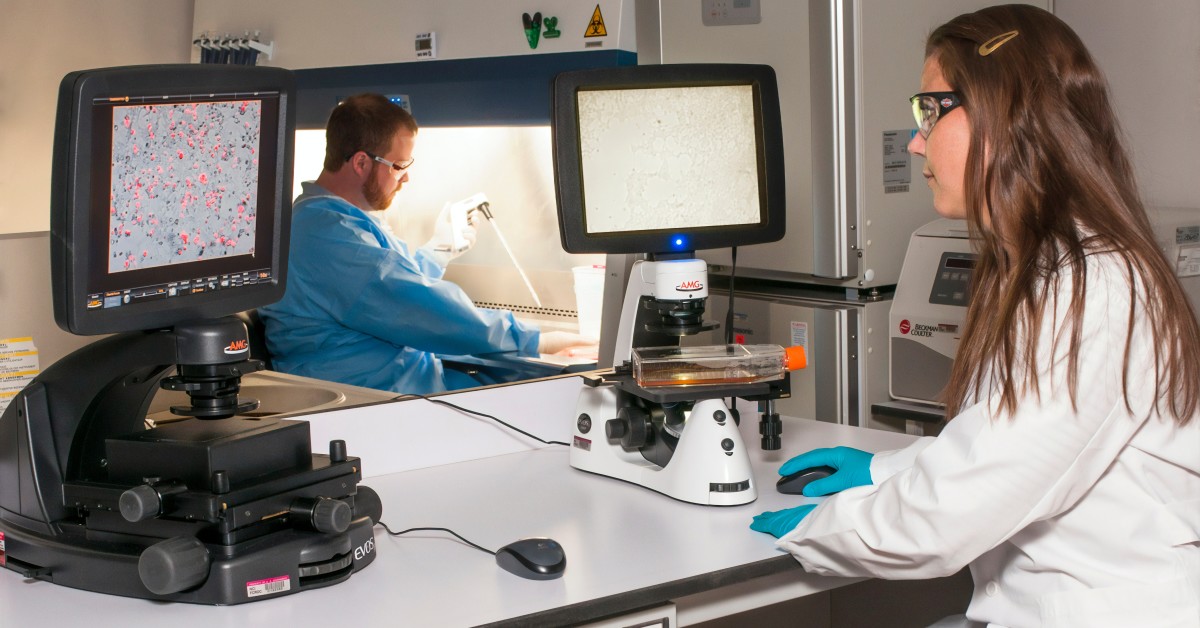
Health Informatics vs. Health Analytics [Difference Explained]
Health informatics and health analytics aren't that different,at least as [...]
![Health Informatics vs. Nursing Informatics [Difference Explained]](https://resources.noodle.com/wp-content/uploads/2023/11/online-marketing-hIgeoQjS_iE-unsplash-1024x542.jpg)
The healthcare industry generates massive quantities of data. Much of it consists of electronic health records, but the billions of gigabytes generated annually also encompass research studies, drug efficacy reports, insurance claims, hospital admissions records, and human resources records.
Harnessing the power of this data requires technology capable of processing vast amounts of unstructured information. But that’s not all: it also demands people who understand how it can improve health outcomes, optimize treatments, improve patient satisfaction, streamline workflow, and reduce costs.
This has led to an explosion of healthcare information management careers. Some data scientists and data analysts now specialize in healthcare. Health information technology specialists, for one, build and maintain the systems that collect health data. Clinical documentation specialists maintain databases of electronic medical records and research.
Health informatics and nursing informatics are two more areas of healthcare information management—both of which feed many possible career pathways. Specialists in these disciplines use technology to support the collection, distribution, organization, and analysis of data. Health informaticists and nurse informaticists play critical roles in medical records keeping. They also handle data related to healthcare delivery, research, and medical device and drug manufacturing.
Choosing between these two career pathways can be challenging because both occupy the intersection of information management and medicine. Specialists in both health informatics and nursing informatics save lives and make healthcare more accessible. The difference between what they do isn’t always clear because there isn’t always a difference.
In this article about health informatics vs. nursing informatics, we cover:
The biggest difference between health informatics and nursing informatics involves scope. Health informatics is a broad, multidisciplinary field encompassing everything from data analysis in health insurance to IT in medical practice management. Everything related to how information and computational innovations can be used to improve healthcare falls under the informatics umbrella. Informaticists are the database administrators, data analysts, and data scientists of the health field. Their work may involve clinical or patient data. Professionals in health informatics jobs are not typically medical practitioners.
Nursing informatics, meanwhile, is part of clinical informatics, a sub-specialty of health informatics. Nurse informaticists are almost always practitioners. They might spend their days focused on resource usage, information acquisition and storage, billing systems, and intranets instead of placing IVs. Even so, they have the training, experience, and credentials necessary to provide patient care. They’ve simply chosen to devote themselves to using data administration and analysis to make nursing more efficient and more effective.
Health informaticists and nurse informaticists sometimes receive the same training. A Master of Science in Health Informatics (MSHI) can lead to careers in both non-clinical and clinical informatics. However, some colleges and universities have created distinct Master of Science in Nursing (MSN) programs for nurses who want to transition into information management. Understanding the difference between these two academic pathways can help you decide which might be best for you.
The curricula in health informatics master’s degree programs and nursing informatics master’s degree programs aren’t necessarily that different. Core courses in both cover information management, data analytics in medicine, IT in healthcare settings, and medical records management. The easiest way to see how the topics covered in these programs differ is to look at actual programs.
The University of Pittsburgh‘s School of Health and Rehabilitation Sciences has an online MS in Health Informatics program. The UPitt health informatics curriculum includes courses like:
This master’s degree pathway for RNs is non-clinical, and very few, if any, core courses focus on patient care. The University of Pittsburgh also has an online nursing informatics master’s program administered by the School of Nursing. Students take classes like:
You probably don’t need a doctorate to succeed in non-clinical informatics unless you plan to pursue a career in academia or research. You should, however, look into informatics-focused Doctor of Nursing Practice (DNP) or PhD in Nursing programs if you intend to spend your career in nursing informatics. While there are plenty of opportunities open to MSN holders, surveys have found nurse informaticists with doctoral degrees earn higher-than-average salaries.
Informatics has specialty areas, and many MSHI programs let students choose from among specialization tracks. The same isn’t true in MSN in Nursing Informatics programs.
Master of Science in Health Informatics concentration areas include:
If you glanced over the list of informatics master’s concentrations above too quickly, you might have missed the fact that nursing informatics is one of them. There are very few nursing informatics specializations because nursing informatics is a specialization.
It’s common for both health informatics master’s programs and nursing informatics master’s programs to be designed for working professionals. Many are offered online in a flexible, part-time format.
Most health informatics master’s degree programs take two years to complete, though accelerated options abound. Intensive one-year programs require a full-time commitment, though these are much less common than hybrid and part-time 18-month accelerated MSHI programs.
MSN programs last anywhere from 16 months to three years. Earning an informatics MSN can take two years of full-time study at some schools, but be aware many programs billed as ‘full-time’ are quite flexible and will let you keep working while earning a degree.
Informatics is a relatively new discipline, but nursing informatics is newer. Consequently, there are more programs in the former than the latter.
There’s no one standout school for informatics, but there are highly-respected programs at:
Nursing schools with MSN in Informatics programs include:
Students pursue non-clinical and clinical informatics master’s degrees online for various reasons related to location, finances, and a need for flexibility.
These colleges and universities have some of the best online health informatics master’s programs:
There are strong online nursing informatics programs at:
MSN programs frequently cost less than MSHI programs, but you can’t make assumptions based on diploma alone. The cost of health informatics programs vs. nursing informatics programs varies substantially from school to school.
You’ll probably pay between $20,000 to $30,000 in total tuition for the typical MSHI, though there are programs that cost more than $75,000.
The typical per-credit tuition rate for clinical and non-clinical MSN programs is about $400 to $700, regardless of concentration. Most MSN in Nursing Informatics programs fall into this range, though top-ranked nursing schools often price their programs higher. The per-credit tuition rate at Duke University School of Nursing, for instance, is about $1,900.
The outlook for healthcare information management jobs is excellent. The outlook for tech-focused jobs may be even better.
According to the US Bureau of Labor Statistics (BLS), jobs for medical records and health information technicians are growing at more than twice the average growth rate for all occupations. That’s not surprising. More people are seeking medical care, healthcare research is booming, and the amount of data being created by the healthcare industry is growing rapidly.
The BLS doesn’t track job growth for nurse informatics careers specifically. Still, it’s safe to assume the outlook for nurse informaticists is similar to health informaticists. Something to consider, however, is that nursing informatics hasn’t always been technical. “When I started in nursing informatics, we were so busy worrying about the data and where is it?” explains Susan K. Newbold, PhD, RN-BC. “Most of it was on paper. Well, now it’s on the computer, thank goodness. We’re starting to put it together in meaningful ways.” Perhaps the best thing you can do for your career is to choose a more technical informatics MSN program.
Health informatics professionals work in all areas of health and medicine, from patient care to pharmaceutical sales, while nurse informaticists usually work for hospitals, healthcare networks, or medical practices. Both may do work involving IT management, systems integration, database design, data analytics, and systems optimization.
Job titles commonly held by MSHI graduates include:
Nursing informatics is one of the highest-paying non-clinical specialties in nursing—possibly because this is a versatile degree. Titles in this discipline include:
With an MSN in Nursing Informatics, you may also be able to transition into any other informatics roles listed above.
The most lucrative roles for health informatics master’s degree holders include:
Again, a nursing informatics master’s degree can help you land one of the top-paying informatics jobs outside of nursing. In nursing, the best-paying roles are:
Now that you’ve read this far, you may be more uncertain than ever about which academic pathway is the right one for you. The good news is you don’t have to be because the health informatics vs. nursing informatics debate isn’t really a debate. Most nursing informatics programs will only admit you if you have an active RN license and a BSN. If you’re not a registered nurse, you have one choice—the MSHI.
If, however, you’re an RN with a few years of clinical work under your belt and you plan to stay in nursing for your entire career, you probably belong in an MSN in Nursing Informatics program. If you currently work in nursing and want the flexibility to transition into other healthcare areas, you’ll get more out of a Master of Health Informatics program.
Neither degree is objectively better. Each is designed for different types of professionals and to support (somewhat) different career paths. As the reach of technology in medicine increases, health informatics and nursing informatics opportunities will grow.
(Last Updated on February 26, 2024)
Questions or feedback? Email editor@noodle.com

Health informatics and health analytics aren't that different,at least as [...]

Some schools and employers use the terms health informatics and [...]

Health informatics is sometimes called biomedical informatics, which sounds a [...]

Informatics and health information management are related healthcare disciplines that [...]

You can't have health informatics without support from health IT. [...]
Categorized as: Health Informatics & Sciences, Nursing Informatics, Nursing & Healthcare